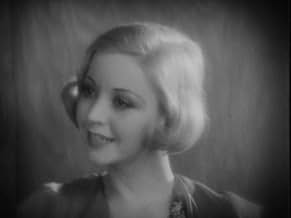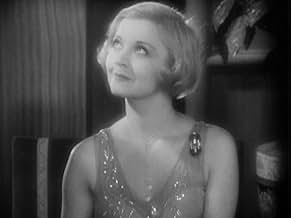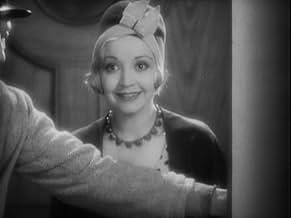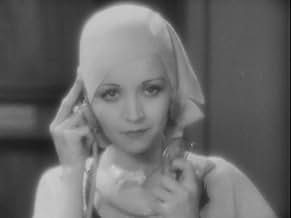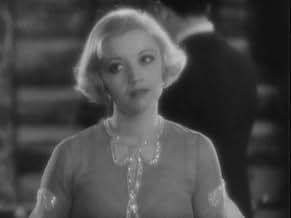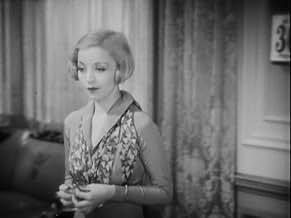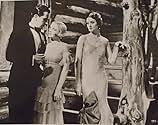Adicionar um enredo no seu idiomaRich party girl sets her eyes on a young attorney.Rich party girl sets her eyes on a young attorney.Rich party girl sets her eyes on a young attorney.
- Direção
- Roteiristas
- Artistas
Sayre Dearing
- Kay's Friend
- (não creditado)
Geraldine Dvorak
- Party Guest
- (não creditado)
Jay Eaton
- Party Guest
- (não creditado)
Adolph Faylauer
- Party Guest
- (não creditado)
Dick Gordon
- Party Guest
- (não creditado)
Thelma Hill
- Friend
- (não creditado)
Lloyd Ingraham
- Judge Drake
- (não creditado)
Jane Keckley
- Office Cleaning Woman
- (não creditado)
Fred Kelsey
- Policeman
- (não creditado)
Marian Marsh
- Kay's Friend
- (não creditado)
- Direção
- Roteiristas
- Elenco e equipe completos
- Produção, bilheteria e muito mais no IMDbPro
Avaliações em destaque
This is a small film and isn't really about much more than a bunch of spoiled rich kids finding out that there is more to life than just being minor league juvenile delinquents. But there are a number of things that make this charming and fun and it's under an hour long so there's not much to lose.
First of all, as many have said, Alice White is such a quintessential flapper that it's no wonder she didn't last beyond the Clara Bow years. Her New Joisey oops Jersey accent is a hoot and different from that of the great prima donna actresses of the era. There is a sequence early in the film where she bats her eyes at Paul Page while riding in a car and she more than bats them. Her eyes are so enormous and dominant that they practically do cartwheels flirting with him. In short, as a male, I find her irresistibly cute and delightful and her firm, clear delivery of lines (essential in early talkies for theaters with not so great sound systems) stands out with the sharpness of a female Eddie Cantor.
Watch also for the barely seen singing group at the big party where microphones are not yet de rigeur and the ensemble sings through megaphones! The flapper clothes are all wonderful and so are the beautiful cars so if you like period fun this is a delight. Myrna Loy is still in her bad girl period here and makes a nasty femme fatale. Paul Page is a Frederic March clone as a leading man and shows naturalness and real talent. Too bad his career simply faded away after 1934.
There's nothing super spectacular here but either you find Alice White doing her naughty flirting is as they used to say "the bee's knees" or you don't. It's easy to underestimate the way she uses her eyes, her body language and her desire to get the most out of every scrap of dialogue she gets. I'm so sorry she had such a fall from grace and a difficult later life but she has become a cult figure for movie buffs who love the early talkies.
Minor but amusing comedy starring that little kewpie doll, Alice White.
For a few years in the late 20s and early 30s White was a big name and starred in a series of comedies and musicals.
In THE NAUGHTY FLIRT she plays a spoiled rich girl who travels in a fast set of country club kids. She runs across a staid lawyer in night court when the "gang" has been hauled in for disturbing the peace at a local dive. He works in her father's law firm.
Because he ignores her she floods him with invitations and finally lures him to a party where he continues to ignore her and pay attention to her rival, Myrna Loy. Of course this drive the little flirt crazy. The "Cinderella Dance" is interesting to say the least.
Myrna and her brother are almost broke (it's 1931) and they have a scheme for him to marry White with her $100,000/year income. So there are some more complications before the final clinch.
Alice White was the Goldie Hawn of her day, a delightful actress who could sing a little and dance a little. She was a rival to Clara Bow and was probably the last of the flappers. She's very good in this comedy. Myrna Loy has fun as the bitchy rival who schemes for money. Paul Page (looking like Fredric March) plays the lawyer. Robert Agnew is Wilbur, George Irving is the father, Douglas Gilmore is Jack, Fred Kelsey is the cop, and Lloyd Ingraham is the judge.
Cute film.
For a few years in the late 20s and early 30s White was a big name and starred in a series of comedies and musicals.
In THE NAUGHTY FLIRT she plays a spoiled rich girl who travels in a fast set of country club kids. She runs across a staid lawyer in night court when the "gang" has been hauled in for disturbing the peace at a local dive. He works in her father's law firm.
Because he ignores her she floods him with invitations and finally lures him to a party where he continues to ignore her and pay attention to her rival, Myrna Loy. Of course this drive the little flirt crazy. The "Cinderella Dance" is interesting to say the least.
Myrna and her brother are almost broke (it's 1931) and they have a scheme for him to marry White with her $100,000/year income. So there are some more complications before the final clinch.
Alice White was the Goldie Hawn of her day, a delightful actress who could sing a little and dance a little. She was a rival to Clara Bow and was probably the last of the flappers. She's very good in this comedy. Myrna Loy has fun as the bitchy rival who schemes for money. Paul Page (looking like Fredric March) plays the lawyer. Robert Agnew is Wilbur, George Irving is the father, Douglas Gilmore is Jack, Fred Kelsey is the cop, and Lloyd Ingraham is the judge.
Cute film.
What a delightful little bit of pre-Code confectionery this is. Alice White is simply adorable, there are lots of playful moments, and Myrna Loy schemes in a supporting role. White plays the wild child of a rich lawyer, partying late and having romances with a lot of different men. When she's on the verge of marrying one of them on the spur of the moment, he has one of his employees (Paul Page) get her out of there. The two of them hit it off, but face challenges in not only her playgirl past, but also in a brother/sister duo (Douglas Gilmore and Myrna Loy) plotting to have Gilmore marry her for her money.
The innuendo in this film is pretty innocent, but as in other pre-Code films, I like the acknowledgement of women's sexuality. That has an honesty about that, even if it was also meant to sell tickets. The plot is simple and the run-time is a brisk 56 minutes, but to me that was a good thing. The flapper scenes - being hauled in by the police after a late night party, with playful defiance of authority in the dialogue - were entertaining. The party scenes - the 'Cinderella dance', and then later dancing the night away to forget heartache - were as well. The clothing, hats, and cars are all beautiful. It's White's movie, but the scene where Loy hatches a scheme to get Page up into her room and into a compromising position is a good one.
In a scene that may define whether you'll like or dislike this movie, White gets a spanking from Page when he discovers she'd made a bet that she could get him to go home with her before midnight, and that she has a history of doing that kind of thing. I found it an amusing little window into the period as the tone was light, then literally laughed out loud at the intertitle which followed, which said "A good old fashioned spanking was the turning point in the life of an ultra-modern girl." However, if that sort of thing is likely to bother you, I'd recommend skipping this film. On the other hand, if you like Alice White, or pre-Code silliness in general, you'll probably like it enough to warrant spending an hour.
The innuendo in this film is pretty innocent, but as in other pre-Code films, I like the acknowledgement of women's sexuality. That has an honesty about that, even if it was also meant to sell tickets. The plot is simple and the run-time is a brisk 56 minutes, but to me that was a good thing. The flapper scenes - being hauled in by the police after a late night party, with playful defiance of authority in the dialogue - were entertaining. The party scenes - the 'Cinderella dance', and then later dancing the night away to forget heartache - were as well. The clothing, hats, and cars are all beautiful. It's White's movie, but the scene where Loy hatches a scheme to get Page up into her room and into a compromising position is a good one.
In a scene that may define whether you'll like or dislike this movie, White gets a spanking from Page when he discovers she'd made a bet that she could get him to go home with her before midnight, and that she has a history of doing that kind of thing. I found it an amusing little window into the period as the tone was light, then literally laughed out loud at the intertitle which followed, which said "A good old fashioned spanking was the turning point in the life of an ultra-modern girl." However, if that sort of thing is likely to bother you, I'd recommend skipping this film. On the other hand, if you like Alice White, or pre-Code silliness in general, you'll probably like it enough to warrant spending an hour.
Spoiled rich girl Kay Elliott (Alice White) can't settle down, or even settle on one guy. In Naughty Flirt, she battles with Alan Ward (Paul Page -only made a few films) and Linda Gregory (Myrna Loy, three years before the Thin Man series) Alice White made many films, but none seem to be well known. She had been in the original, silent "Gentlemen Prefer Blondes" 1928. White appeared in more than her share of movies with suggestive names (Naughty Baby, Hot Stuff, Lingerie, Playing Around) This is a good story, but you can tell it was made just as sound was coming in play - they were heavy on the eye makeup, and they even use subtitle cards several times. Also a music track playing under most of the dialogue. Keep an eye out for Fred Kelsey as the cop at the beginning - made a career out of playing the policeman (the Man Who Came to Dinner, Larceny Inc, the Bride Walks Out)
Alice White was an adorable flapper, whose career was over before it started. She was First National's answer to Clara Bow but she didn't have the longevity of the red headed "It" girl. 1931 started with "The Naughty Flirt", one of her best films and ended with "Murder at Midnight", in which, although billed prominently, she was only given about two decent scenes.
The plot is 60 minutes of frivolous fun with White doing what she does best - being adorably flirty and making every man her slave. When Kay (Alice White) and her gang are hauled into night court for disorderly conduct, she meets Alan Ward (Paul Page) an associate with her father's law firm and it doesn't take him long to fall under her spell. She already has a persistent suitor in Jack Gregory (Douglas Gilmore) who is always asking Kay to marry him. He, along with his scheming sister, Linda (Myrna Loy) have ulterior motives - they have been wiped out in the stock market crash and hope that if Jack can marry Kay their financial worries will be at an end.
The "Cinderella Dance" is one of the film's highlights - all the girls take off one of their shoes, put it in the middle of the ballroom and then the boys have to pick one and dance with it's owner. White, who made her name with a couple of excellent musicals from the early talkie era ("Broadway Babies" (1929) and "Show Girl in Hollywood" (1930)) is not asked to sing or dance here which is a pity. She also gets a run for her money from Myrna Loy as the sultry Linda. Why it took so long for Loy to "make it" (1933's "Animal Kingdom" was her big break) is one of Hollywood's real mysteries. However White's cutie pie acting wins through - she is impossible to resist.
Although she had a very hectic private life, maybe what happened to Alice White were films like "The Naughty Flirt". 1931 was one of the worst years of the depression and with a title like "The Naughty Flirt", reminiscent of a jazzy, carefree past, the movie going public may have been turned off. In this year of unemployment and breadlines, if films started out with scenes of high living ("Bad Company" and "Dance Fools, Dance") audiences wanted to see stars really suffer before realising that the simple life was the best.
Highly Recommended.
The plot is 60 minutes of frivolous fun with White doing what she does best - being adorably flirty and making every man her slave. When Kay (Alice White) and her gang are hauled into night court for disorderly conduct, she meets Alan Ward (Paul Page) an associate with her father's law firm and it doesn't take him long to fall under her spell. She already has a persistent suitor in Jack Gregory (Douglas Gilmore) who is always asking Kay to marry him. He, along with his scheming sister, Linda (Myrna Loy) have ulterior motives - they have been wiped out in the stock market crash and hope that if Jack can marry Kay their financial worries will be at an end.
The "Cinderella Dance" is one of the film's highlights - all the girls take off one of their shoes, put it in the middle of the ballroom and then the boys have to pick one and dance with it's owner. White, who made her name with a couple of excellent musicals from the early talkie era ("Broadway Babies" (1929) and "Show Girl in Hollywood" (1930)) is not asked to sing or dance here which is a pity. She also gets a run for her money from Myrna Loy as the sultry Linda. Why it took so long for Loy to "make it" (1933's "Animal Kingdom" was her big break) is one of Hollywood's real mysteries. However White's cutie pie acting wins through - she is impossible to resist.
Although she had a very hectic private life, maybe what happened to Alice White were films like "The Naughty Flirt". 1931 was one of the worst years of the depression and with a title like "The Naughty Flirt", reminiscent of a jazzy, carefree past, the movie going public may have been turned off. In this year of unemployment and breadlines, if films started out with scenes of high living ("Bad Company" and "Dance Fools, Dance") audiences wanted to see stars really suffer before realising that the simple life was the best.
Highly Recommended.
Você sabia?
- CuriosidadesMyrna Loy's last film at Warner Brothers before moving on to 20th Century-Fox and finally MGM.
- Citações
Invitation: Miss Kay Elliott / requests the honor of your presence / at an informal party given / in Honor of her Annual Expulsion / from Miss Baynor's Select School / for Young Ladies // Embassy Roof / Saturday May third / ten P. M. until?---
- Trilhas sonorasUntitled Song
(uncredited)
Composer unknown (probably Sam H. Stept)
Played during the opening credits and often as background music
Played as dance music at the country club and sung ("I often wonder if you cared ...") by an unidentified trio
Hummed by Paul Page
Principais escolhas
Faça login para avaliar e ver a lista de recomendações personalizadas
Detalhes
- Tempo de duração
- 56 min
- Cor
Contribua para esta página
Sugerir uma alteração ou adicionar conteúdo ausente

